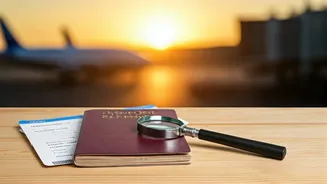Lost or Stolen
One of the most critical things to avoid is misplacing your passport. Losing your passport can lead to significant travel disruptions and potential identity
theft. It’s essential to always know where your passport is. Consider keeping it in a secure place, like a money belt or a hotel safe, and never leave it unattended in public areas. If your passport is lost or stolen, immediately report it to the local police and your country's embassy or consulate. This action is crucial to prevent misuse and to facilitate the process of getting a replacement. Be vigilant and take precautions to protect this vital document.
Damage of the Passport
Protecting your passport from damage is paramount. Physical damage, such as tearing, water damage, or significant wear and tear, can render your passport invalid. Always carry your passport in a protective sleeve or passport holder to shield it from the elements and physical impacts. Avoid bending or folding your passport, as this can damage the chip and other sensitive components. Keep it away from wet environments to prevent water damage. Regularly inspect your passport for any signs of damage and replace it if necessary to avoid travel complications.
Expired Passports
Never attempt to travel with an expired passport. Most countries require passports to be valid for at least six months beyond your planned stay. Failing to meet this requirement can lead to denied entry, delayed travel, and other inconveniences. Always check your passport's expiration date well in advance of your trip. If your passport is nearing expiration, renew it promptly. Ensure you have ample time to receive your new passport, especially when applying for renewals close to your departure date.
Unauthorized Alterations
Avoid making any alterations to your passport, whether intentional or accidental. Any tampering, such as modifying information or adding stickers, can invalidate your passport. Keep your passport in its original condition. Do not add any personal notes or stickers, and never attempt to laminate or modify any pages. Passport officials are trained to identify alterations. Unauthorized changes can result in confiscation, denied entry, and potential legal consequences. Treat your passport as an official document and handle it with the utmost care to preserve its validity.
Ignoring Visa Needs
Neglecting visa requirements is a significant pitfall for international travelers. Many countries require visas for entry, and it's your responsibility to ensure you have the necessary documentation before your trip. Research the visa policies of your destination country well in advance of your travel dates. Check the specific requirements, application procedures, and processing times. Make sure you apply for the visa well in advance. Some visas can take several weeks or months to process. Arriving at your destination without the required visa will result in denied entry and potentially wasted travel expenses.
Sharing the Passport
Never share your passport with anyone. Your passport is a personal document and should only be handled by you. Sharing it with others, even trusted individuals, can lead to identity theft, fraud, or misuse of your personal information. Keep your passport secure and under your control at all times. Do not lend it to anyone. In case of any official requirements such as at hotels or border checks, always be present when your passport is being handled by authorities. This precaution is important for protecting your personal data and preventing any unauthorized access.
Unsafe Storage Places
Choosing the wrong place to store your passport can increase the risk of damage or loss. Avoid storing your passport in direct sunlight, excessively humid environments, or places where it could be easily accessible to others. It’s also important to avoid keeping your passport with items that could damage it, such as sharp objects or liquids. Consider using a passport holder with RFID-blocking technology to protect your information from electronic theft. When at home, keep your passport in a secure location, like a locked drawer or safe. This simple practice ensures both the physical safety and the privacy of your valuable document.
Not Updating Information
Failing to update your passport information, such as name changes or address updates, is another mistake. If your name changes due to marriage or legal proceedings, you must update your passport. Similarly, if your address changes, although not always mandatory, updating it can be helpful for receiving important notifications. Always ensure your passport information matches your current identity. Keep your contact details current so that if your passport is lost or stolen, you can be reached easily. Updating this information will prevent any travel difficulties.













